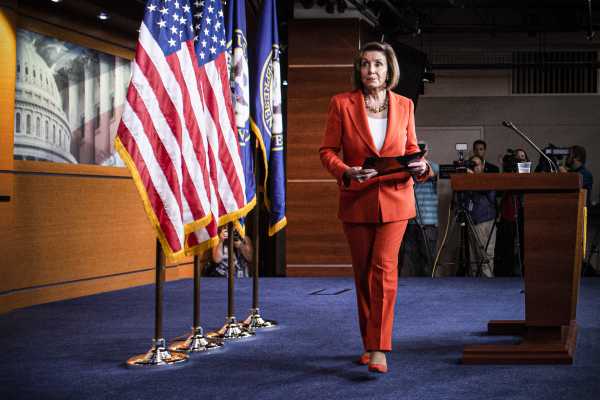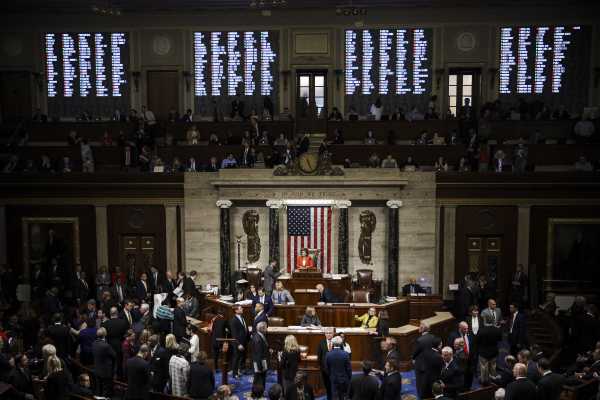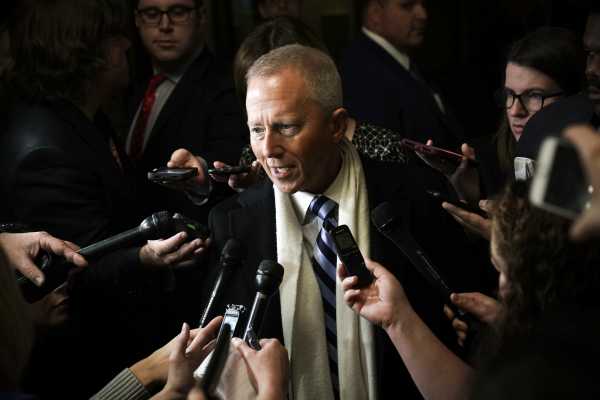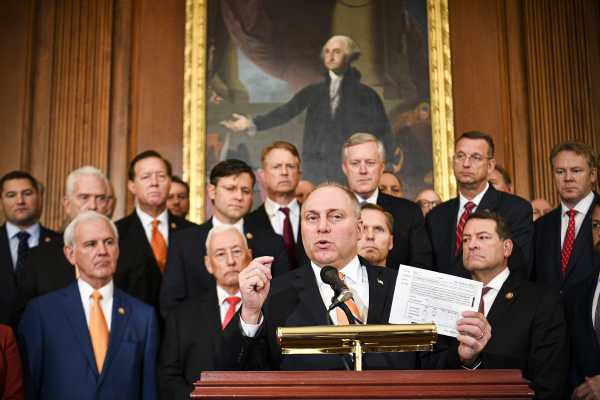
The resolution vote showed Democrats are unified on their impeachment inquiry
And Republicans aren’t budging.
By
Ella Nilsen, Tara Golshan, and Li Zhou
Oct 31, 2019, 2:00pm EDT
Share this story
-
Share this on Facebook
-
Share this on Twitter
-
Share
All sharing options
Share
All sharing options for:
The resolution vote showed Democrats are unified on their impeachment inquiry
-
Reddit
-
Pocket
-
Flipboard
-
Email
An hour before the House’s Thursday vote formally laying out the process of the impeachment inquiry into President Donald Trump, Speaker Nancy Pelosi took the House floor to set the tone: resolute, yet somber.
“This is something that is very solemn,” Pelosi said, standing next to a posterboard of the American flag. “Nobody … comes to Congress to impeach a president of the United States.”
The pivotal resolution passed the House 232 to 196. Two moderate Democrats, Reps. Collin Peterson (D-MN) and Jeff Van Drew (D-NJ) voted against the resolution, joining all House Republicans. Rep. Justin Amash (I-MI), who recently left the Republican Party, voted in favor.
Thursday’s vote showed how far a once-splintered Democratic caucus has come on impeachment. A few months ago, many Democrats including Pelosi didn’t want to broach the subject — saying the public clearly didn’t support it. But the explosive revelations that Trump had asked Ukrainian President Volodymyr Zelensky to dig up political dirt on former Vice President Joe Biden, and allegations the president tied that demand to US military aid changed everything.
As evidence has mounted and Trump administration officials has come forward to testify in front of House committees, public support for impeachment has grown, according to polling tracking from FiveThirtyEight.

Democrats on the impeachment committees say the resolution will allow the American public to witness what committee members have seen behind closed doors over the past six weeks. They plan to call career administration officials who have served in both Republican and Democratic administrations as witnesses.
Public hearings are expected to begin in two to three weeks, Rep. Stephen Lynch (D-MA), who sits on one of the committees leading the inquiry, told Vox.
“I think there are a number of witnesses here who are incredibly believable,” Lynch told Vox outside the House floor Thursday. “There’s a lot there. With the quality of the evidence and the quality of the witnesses, there’s a substantial body of work here that’s we’ve produced in the last six weeks.”
“We still got more interviews to conduct,” said Rep. Will Hurd (R-TX), a moderate Republican who sits on the House Intelligence Committee.
For months, as calls for an impeachment inquiry in the House has escalated among Democrats, Pelosi has been a voice of caution, warning impeachment could be too divisive. But on Thursday, Pelosi appeared no longer interested in these concerns.
“We cannot ignore, and we will not ignore when the president’s behavior indicates that investigation, that inquiry is necessary,” Pelosi said. “As the inquiry proceeds, we’ll decide whether we’ll go forward with impeachment, that decision has not been made.”
At a press conference before the vote, she closed her remarks with the hint of a smile: “I have business on the floor that I have to see to,” Pelosi told reporters, on her way to take the Speaker’s chair on the House floor.
The political tide on impeachment has officially changed
For months before the Ukraine scandal broke, Pelosi had been hesitant to wade into a full-blown impeachment inquiry, fearing it could put moderate Democratic lawmakers in danger ahead of the 2020 elections.
But the Ukraine scandal changed everything. The focus on Democrats’ impeachment inquiry hasn’t faded. Instead, a steady stream of witnesses have come forward to talk to lawmakers, sharing grave concerns around Trump’s behavior. Thursday’s vote demonstrated a substantial amount of unity within the Democratic caucus on impeachment.
Just two moderate Democrats ultimately defected, including Van Drew, who was first elected in November. Hours before the vote, another lawmaker who had previously been an impeachment holdout, Rep. Kendra Horn (D-OK), announced she would vote for the resolution.

Van Drew, however, told reporters he viewed the whole exercise as a waste of time. Trump won Van Drew’s district in 2016, and Van Drew flipped the district from Republican to Democrat in a surprisingly tight race in 2018. The former dentist whose district includes Atlantic City, has long been a vocal opponent of the inquiry (earning praise from none other than Trump).
“I think this splits the country apart further, it is only about 13 months until an election,” the Democrat, wearing a pinstripe suit, told a scrum of reporters. “Let’s let the people choose. let them impeach if they want to impeach. I don’t think he will be convicted in the Senate, so we will have [put in] all this time, all this money all this energy all this effort, [for] a failed impeachment, the same president and the same presidential candidates.”
Aside from Van Drew and fellow anti-impeachment moderate Collin Peterson, whose district Trump carried by 30 points in 2016, the broader caucus was firmly united in the final vote, an outcome that members of the party celebrated. “I didn’t think there were any defections, really,” House oversight committee member John Sarbanes (D-MD) told Vox. “There was this giant Democratic vote in support of it, I thought that was pretty awesome.”
“Everyone in a vote of this magnitude has to do what they feel is right and what’s right for their constituents,” added Rep. Katherine Clark (D-MA), the vice-chair of the House Democratic Caucus.
Pelosi’s own caution toward impeachment in the past has now become part of her pitch to the American public: that Democrats’ slow inch toward a formal proceeding was part of a deliberative process. That, however, has not warded off Republicans’ complaints.
This was a procedural vote. Republicans are still complaining about process.
Republicans took the floor one by one Thursday morning to call the investigation into Trump a scam, question Pelosi’s leadership, and peg Democrats as shady, secretive agents desperately rushing to take down a political foe.
“Trying to put a ribbon on a sham process doesn’t make it any less of a sham,” Rep. Jim Jordan (R-OH), one of Trump’s close allies and staunch defenders in the House said on the House floor ahead of the speech.
Republicans have been focused on a provision in the resolution around witnesses. The minority will be allowed to call up their own witnesses, but only if they submit “a detailed written justification of the relevance” of testimony and if either Schiff or a majority vote on the committee gives approval. The measure is one way Democrats are hoping to prevent Republicans from derailing proceedings. It’s also consistent with how such requests have been handled in prior impeachment probes.
Standing next to a poster with a hammer and sickles, Republican Minority Whip Rep. Steve Scalise (R-LA) called the House Democrats impeachment inquiry “37 Days of Soviet-style impeachment proceedings,” to a round of applause from his Republican House colleagues.
“Maybe in the Soviet Union you do things like this where only you make the rules,” Scalise said. “Where you reject the ability for the perp you are accusing to even be in the room, to question what’s going on.”

For weeks Republicans were quick to point out that Democrats began conducting an investigation without voting on an impeachment resolution, skirting a traditional procedural step. Now, that Democrats have voted on the resolution — with near unanimity — Republicans’ procedural talking points have shifted.
Rep. Cathy McMorris Rodgers (R-WA) argued that the vote itself was indicative of how Democrats were abusing the process. “I’m very dismayed by the process, even on the floor, that they wouldn’t recognize the minority,” she told Vox. “We need transparency.”
What’s next on impeachment
The resolution the House just passed lays out the procedures around public hearings. But there’s no set date for when those public hearings will start.
Rep. Lynch, a Massachusetts Democrat who sits on the House Oversight Committee and has been in the closed-door depositions, told Vox he expects public hearings to start in the next two to three weeks. Lawmakers are now headed home for a week of recess, which means they have two weeks to conduct public hearings before the Thanksgiving holiday.
Although many in the Democratic caucus once said they believed impeachment would be wrapped up by the end of the year, it’s not clear if that timeline is achievable. Pelosi, for one, has not put any such timeline out.
Even though Thursday’s vote was momentous, Pelosi was still treading cautiously on the subject of whether Democrats would ultimately impeach the president.

“As the inquiry proceeds, we’ll decide whether we’ll go forward with impeachment, that decision has not been made,” Pelosi told reporters.
More immediately, Lynch said there are still a few remaining details to be ironed out in the coming weeks; the committees conducting the impeachment inquiry want to speak to Trump’s former National Security Adviser John Bolton, and are still in a “tug of war” with the State Department over documents they’ve requested. But Lynch told Vox he thinks the committees are building a solid case, which they’re preparing to make public.
“It gives a lot of people plenty to think about,” Lynch said. “Like Speaker Pelosi, I won’t get ahead of that process, but the time with witnesses and the time with the evidence has been well-spent, and I think there’s a case to be made.”
Sourse: vox.com






